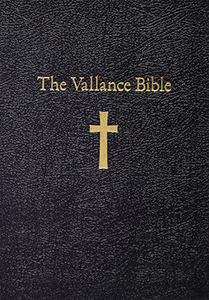The Bible according to Jeffrey Vallance: a mystical and blasphemous apocryphal tale.
While visiting the International Museum of Reformation—during his first stay in Geneva upon the invitation of the Centre d'édition contemporaine—the artist has felt connected with the figure of John Calvin inviting all good Christians to spread the word of God widely. From a distance of five centuries, he takes the message seriously by publishing nothing less than his own Bible—The Vallance Bible. This audacious decision seems to wear the seal of paradox as well: a spiritual and artistic accomplishment, and a blasphemous act, or at least one largely tainted by irony.
In The Vallance Bible, the artist gratifies us with original drawings, a bookmark and with a “portable” and “touch”-relic, i.e. a piece of cloth impregnated with the artist's sweat on the occasion of a performance given in the fitness studio of a YMCA. In short, the holy shroud within everybody's reach.
Published on the occasion of the eponymous exhibition,
Centre d'édition contemporaine, Geneva, from March 30 to May 5, 2012.
Coming from the counterculture, Jeffrey Vallance (born 1955, lives and works in Reseda, Los Angeles) is a Californian artist who revisits religious rituals, folklore and fetishist practices. While he slips in turn into the clothes of an ambassador, an anthropologist, an explorer, a writer, a professor or an investigator in paranormal phenomena, Vallance remains a compulsive collector whose stock-in-trade is nourished by personal and collective mythologies. Influenced by his forebear Emil Knudsen (1872–1956), famous Norwegian medium, he strongly believes in the part inspiration plays in his work, often perceived as a conversation with the hereafter. He thus turns his everyday life into an enchanted world, open to acts of faith, mysteries and revelations. Raised within the strict Lutheran tradition and involved with a contemporary art practice flirting with heresy, Vallance solves this apparent contradiction in its dyslexic nature that allows him to let contradictory beliefs coexist in harmony.







